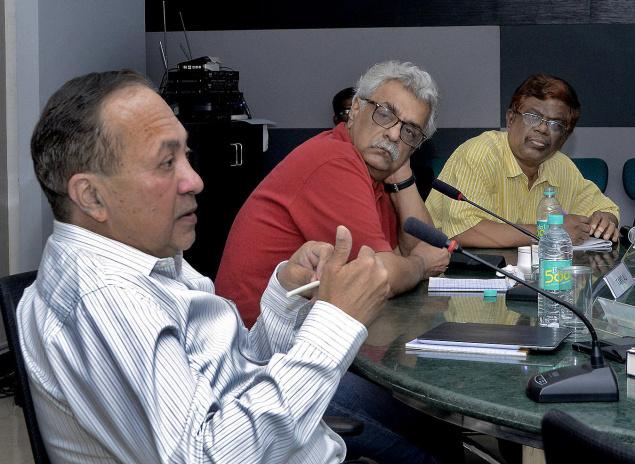A range of issues concerning the media — from the growing corporate control to the explosion in social media — and the challenge of staying objective in the face of a decline in the “moral universe” were discussed by renowned journalists, acclaimed writers, and academicians here on Wednesday.
Underscoring the significance of total freedom for producers and directors of media houses, writer, filmmaker and journalist Tariq Ali said much of their success in the past was because they enjoyed the right to fail, while coming up with initiatives. With market forces coming into play, heads of departments no longer had that right and decisions were being made by managers. This was one reason for media productions looking so similar.
Mr. Ali was participating in a panel discussion on ‘New imperialism, new wars, new media and new Left’ organised by the Media Development Foundation (MDF) at the Asian College of Journalism. “Young people think getting involved with the original Left is not going to lead them anywhere.” What it resulted in are huge movements, participants of which occupy public squares but are not able to arrive at a set of demands, he said, citing his interactions with some ‘Occupy Wall Street’ protesters.
There could be no forward movement without some form of politics, he said, adding there was no clear solution either “for us or for the rulers” as they (politicians) had obstinately refused to change course and the Opposition did not know what to propose.
Kasturi & Sons Ltd Director and former Editor-in-Chief of The Hindu N. Ram said that apart from playing a credible information function and remaining investigative and apolitical, one key function of the media was to “destabilise unjust policies.”
Quoting economist Prabhat Patnaik, he said the change in the moral universe was behind the decline in the power of the media. It was due to a degree of confusion and uncertainty about what was right and wrong. So long as the media were on the same side as international finance capital, they appeared powerful, but when upholding humane values, they seemed powerless.
There was clear evidence that free speech was under threat, Mr. Ram said concurring with the retired Madras High Court judge, Justice K. Chandru’s view that Section 66A of the Information Technology Act was being misused to arrest and prosecute users of social media for even innocuous comments on political leaders.
Jawaharlal Nehru University professor M.S.S. Pandian said the new media had closed the possibility of people being in touch with ground reality. There was need to “reclaim the street.”
MDF Chairman Sashi Kumar noted with concern that the entry barriers to new television channels had increased. Also, growth in media did not mean growth in journalism. To cope with the competition from new media, reporters in traditional media were resorting more and more to editorialising.
CPI(M) leader M.A. Baby said Kerala, West Bengal and Andhra Pradesh had models of television channels being publicly owned and run successfully. Citing the example of FAIR (Fairness and Accuracy in Reporting), a media watch group in the U.S., he said a similar mechanism could be evolved in India to question media bias and force mainstream media houses to withdraw misinformation.
The discussion was moderated by art critic Sadanand Menon.
The participants included C.P. Chandrasekar, Ram Manohar Reddy, Venkatesh Athreya, K. Nagaraj, Milind Brahme, Geetha Ramaseshan, Gnani and Nityanand Jayaraman.

